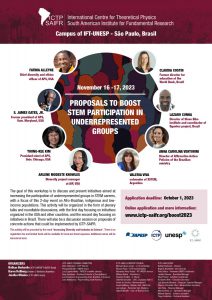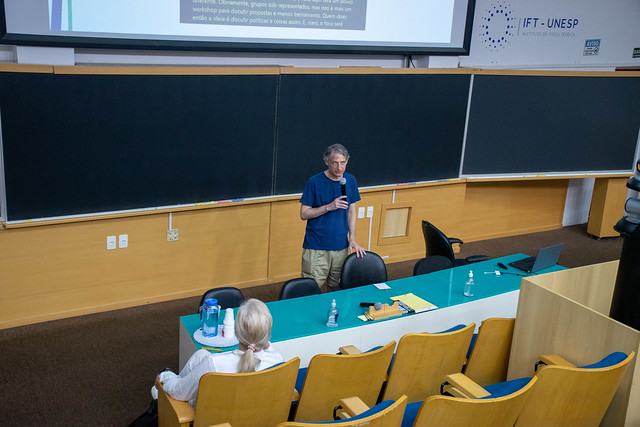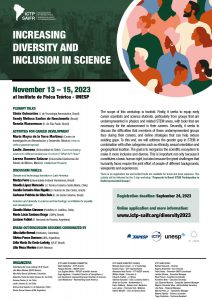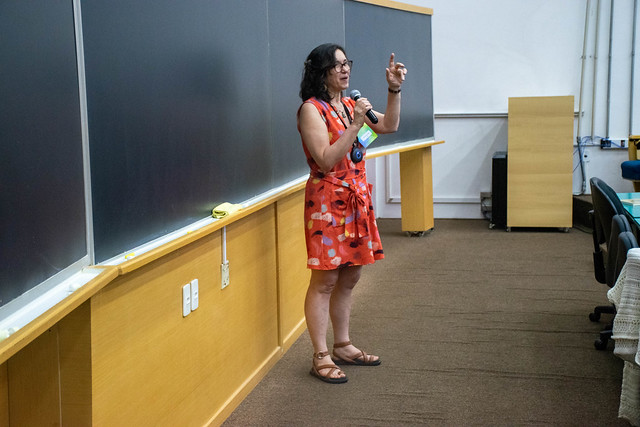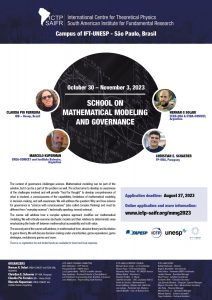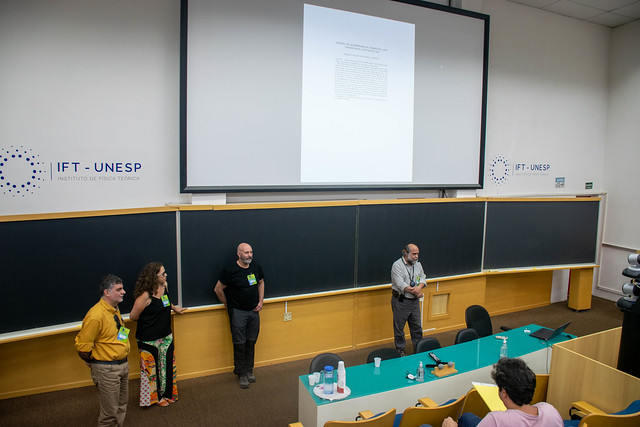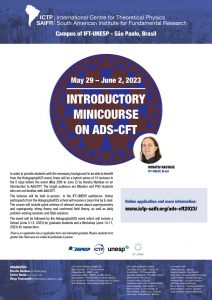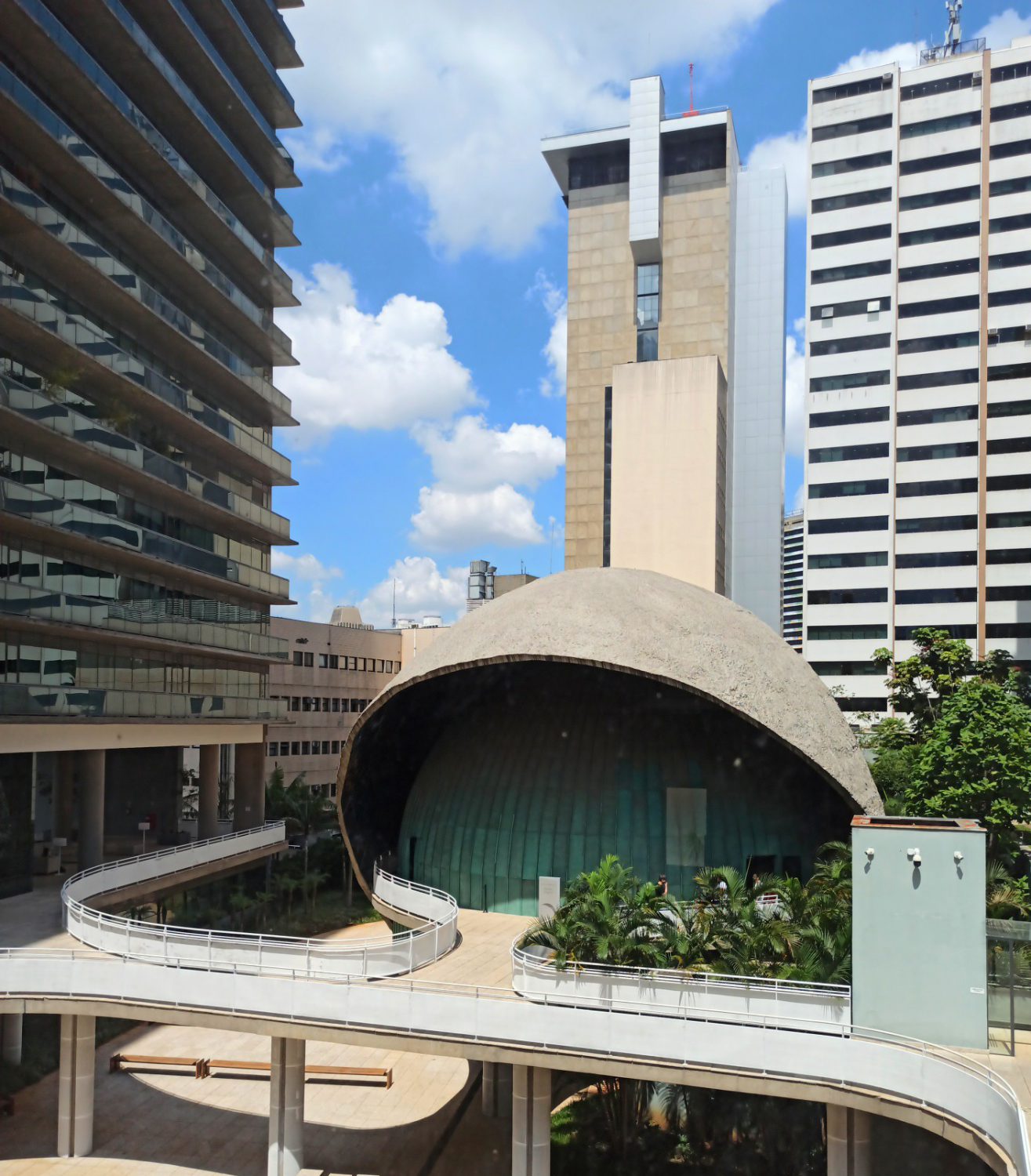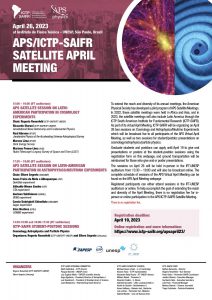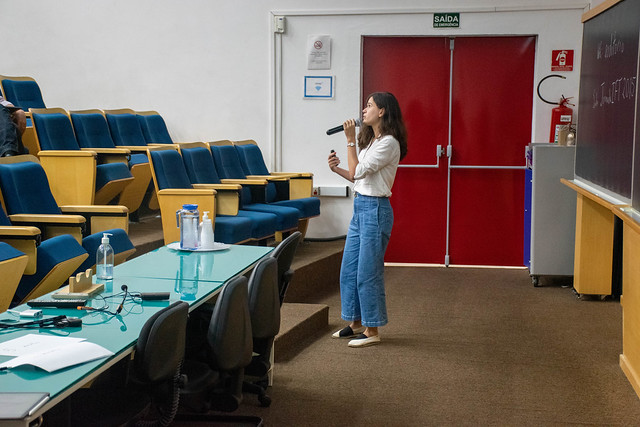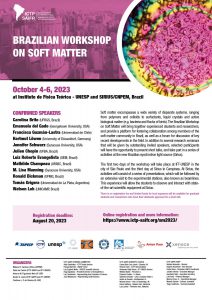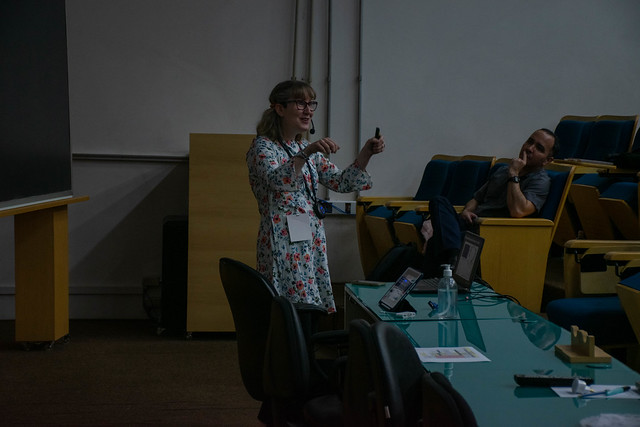Search Results
Proposals to Boost STEM Participation in Underrepresented Groups
November 16 -17, 2023
São Paulo, Brazil
ICTP-SAIFR/IFT-UNESP

Home
The goal of this workshop is to discuss and present initiatives aimed at increasing the participation of underrepresented groups in STEM careers, with a focus of this 2-day event on Afro-Brazilian, indigenous and low-income populations. This activity will be organized in the form of plenary talks and roundtable discussions, with the first day focusing on initiatives organized in the USA and Argentina, and the second day focusing on initiatives in Brazil. The talks will be in English and Spanish on the first day and Portuguese on the second day. There will also be a discussion session on proposals of concrete actions that could be implemented by ICTP-SAIFR.
This activity will be preceded by the event “Increasing Diversity and Inclusion in Science“. There is no registration fee and limited funds will be available for local and travel expenses.
Organizers:
- Nathan Berkovits (ICTP-SAIFR/IFT-UNESP, Brazil)
- Karen Hallberg (Balseiro Institute-Bariloche, Argentina)
- Jandira Oliveira (ICTP-SAIFR, Brazil)
List of Participants: Updated on November 22, 2023
Survey: HERE.
Speakers
Thursday, Nov. 16:
- Young-Kee Kim (President-elect of American Physical Society, Univ. Chicago, USA): APS activities: Enhancing inclusivity & embracing diverse perspectives
- Silvina Ponce Dawson (President-designate of the International Union of Pure and Applied Physics, Argentina): The International Union of Pure and Applied Physics and its actions to increase inclusion and diversity in physics
- S. James Gates, Jr. (former president of American Physical Society, Univ. Maryland, USA): Achieving the dream: My life in math and science, defying barriers and living diversity in STEM
- Valeria Viva (cofounder of XSTEM, Argentina): STEM education at early stages for inclusion in Latin America.
Friday, Nov. 17:
- Maria Lucia de Santana Braga (analista e membro da equipe do Programa Mulher e Ciência do CNPq, Brasil): O Painel de Fomento em Ciência, Tecnologia e Inovação do CNPq e suas contribuições para a pluralidade na ciência
- Lazaro Cunha (diretor do Instituto Cultural Steve Biko e coordenador do projeto Oguntec, Brasil): Programa Oguntec: uma experiência de ações afirmativas na educação científica de jovens negros e negras de escolas públicas da Bahia
- Rogerio Monteiro de Siqueira (EACH-USP, Brasil): O programa de pós-doutorado para pesquisadoras e pesquisadores negros na USP: Histórico, perfil dos bolsistas, perspectivas de trabalho
- Celso Lins de Oliveira (FZEA-USP, Brasil): As barreiras e a sub-representação negra na docência do Ensino Superior Brasileiro
- Marcelo Knobel (ex-reitor da Unicamp, Brasil): Mesa redonda
- Rodrigo Capaz (Presidente da Sociedade Brasileira de Física, Brasil): Mesa redonda
Registration
Program
Download PDF version: HERE
Videos and Files
- 09:30 - Young-Kee Kim (President-elect of American Physical Society, Univ. Chicago, USA): APS activities: Enhancing inclusivity & embracing diverse perspectives
- 10:15 - Silvina Ponce Dawson (President-designate of the International Union of Pure and Applied Physics, Argentina): The International Union of Pure and Applied Physics and its actions to increase inclusion and diversity in physics
-
11:20 - S. James Gates, Jr (former president of American Physical Society, Univ. Maryland, USA):
Achieving the dream: My life in math and science, defying barriers and living diversity in STEM
-
12:05 - Valeria Viva (cofounder of XSTEM, Argentina):
STEM education at early stages for inclusion in Latin America
-
14:30 - TBA (TBA):
Roundtable discussion involving speakers
- 09:30 - Maria Lucia de Santana Braga (analista e membro da equipe do Programa Mulher e Ciência do CNPq, Brazil): O Painel de Fomento em Ciência, Tecnologia e Inovação do CNPq e suas contribuições para a pluralidade na ciência
-
10:15 - Lazaro Cunha (director of Steve Biko Institute and coordinator of Oguntec project, Brazil):
Programa Oguntec: uma experiência de ações afirmativas na educação científica de jovens negros e negras de escolas públicas da Bahia
- 11:20 - Rogerio Monteiro de Siqueira (EACH-USP, Brazil): O programa de pós-doutorado para pesquisadoras e pesquisadores negros na USP: Histórico, perfil dos bolsistas, perspectivas de trabalho
-
12:05 - Celso Lins de Oliveira (FZEA-USP, Brazil):
As barreiras e a sub-representação negra na docência do Ensino Superior Brasileiro
-
14:00 - Proposals to Boost STEM Participation in Underrepresented Groups (ICTP-SAIFR):
Roundtable discussion involving speakers - 2
asdasdasd
Photos
Additional Information
BOARDING PASS: All participants, whose travel has been provided or will be reimbursed by ICTP-SAIFR, should bring the boarding pass upon registration. The return boarding pass (PDF, if online check-in, scan or picture, if physical) should be sent to secretary@ictp-saifr.org by e-mail.
COVID-19: Brazilians and foreigners no longer have to present proof of vaccination before entering the country.
Visa information: Nationals from several countries in Latin America and Europe are exempt from tourist visa. Nationals from Australia, Canada and USA are exempt from tourist visa until January 10, 2024. Please check here which nationals need a tourist visa to enter Brazil.
Accommodation: Participants, whose accommodation will be provided by the institute, will stay at The Universe Flat. Hotel recommendations are available here.
How to reach the Institute: The school will be held at ICTP South American Institute, located at IFT-UNESP, which is across the street from a major bus and subway terminal (Terminal Barra Funda). The address which is closer to the entrance of the IFT-UNESP building is R. Jornalista Aloysio Biondi, 120 – Barra Funda, São Paulo. The easiest way to reach us is by subway or bus, please find instructions here.
Continue Reading |
Comments Off on
Increasing Diversity and Inclusion in Science
November 13 – 15, 2023
São Paulo, Brazil
ICTP-SAIFR/IFT-UNESP

Home
The scope of this workshop is twofold. Firstly, it seeks to equip early career scientists and science students, particularly from groups that are underrepresented in physics and related STEM areas, with tools that are necessary for the advancement in their careers. Secondly, it seeks to discuss the difficulties that members of these underrepresented groups face during their careers, and define strategies that can help reduce existing gaps. To this end, we will address the gender gap in STEM in combination with other categories such as ethnicity, sexual orientation and geographical location. The goal is to reorganize the scientific ecosystem to make it more inclusive and diverse. This is important not only because it constitutes a basic human right, but also because the great challenges that humanity faces require the joint effort of people of different backgrounds, viewpoints, and experiences.
During the three-day workshop we will have:
- Plenary talks by researchers at different stages of their careers combining a description of their research and their lives.
- Two hands-on activities and a talk to give tools for career development.
- Discussion panels on “Gender and technology transition in Latin America” and “Inclusion and diversity in science and technology: an initiative for equality and development”.
- Poster session.
- Discussion sessions with the final goal of producing a list of recommendations.
This activity will be followed by the two-day workshop “Proposals to Boost STEM Participation in Underrepresented Groups“. There is no registration fee and limited funds are available for travel and local expenses.
Organizers:
- Zélia Maria Da Costa Ludwig (UFJF, Brazil)
- Lilia Meza Montes (BUAP, Mexico)
- Alba Avila-Bernal (UniAndes, Colombia)
- Alejandra Paola Gonzalez Vasquez (Universidad de Chile)
- Denisse Pasten (Universidad de Chile)
- Leslie Jiménez (Universidad de Chile)
- Andrea Vera Gajardo (Universidad de Valparaíso, Chile)
- Silvina Ponce Dawson (UBA, Argentina)
List of Participants: Updated on November 16, 2023.
Survey: HERE.
Speakers, Coordinators and Panelists
Plenary talks by researchers at different stages of their careers:
- Sônia Guimarães (Instituto de Tecnologia Aeronáutica, Brazil): My Journey, Advocacy Work to Improve Brazilian Scientists Diversity
- Sendy Melissa Santos do Nascimento (Brazil): Women in Colors
- Renata Wasserman (Universidade de São Paulo, Brazil): Women in CS and IA: A personal perspective
Activities for career development:
Hands-on
- María Mayra de la Torre Martínez (Centro de Investigación en Alimentación y Desarrollo, Mexico): How to write a paper/proposal
- Leslie Jimenez (Universidad de Chile): Communicating science to different audiences: to whom? What for? How?
Talk
- Lorena Romero Salazar (Universidad Autónoma del Estado de México, Mexico): Intellectual Property
Discussion panels:
1.Gender and technology transition in Latin America
- Mariza Ferro (Universidade Federal Fluminense, Brazil)
- Claudia López Moncada (Universidad Técnica Federico Santa María, Chile)
- Camila Carneiro Dias Rigolin (Universidade Federal de São Carlos, Brazil)
- Carleane Patricia da Silva Reis (Universidade de Santa Catarina, Brazil)
2.Inclusion and diversity in science and technology: an initiative for equality and development
- Claudia Matus Cánovas (Pontificia Universidad Católica, Chile)
- Maria Lúcia Santana Braga (CNPq, Brazil)
- Luciano Fabbri (Universidad Nacional de Rosario, Argentina)
Poster sessions
Discussion sessions coordinated by the organizers, Alba Avila Bernal, Lilia Meza Montes, Zélia Maria Da Costa Ludwig and Silvina Ponce Dawson
Registration
Program
Download program: Here
Videos and Files
- 09:30 - Sendy Melissa Santos do Nascimento (Brazil): Women in Colors
- 11:00 - María Mayra de la Torre Martínez (Centro de Investigación en Alimentación y Desarrollo, Mexico): How to write a paper/proposal
-
14:00 - Leslie Jimenez (Universidad de Chile):
Communicating science to different audiences: to whom? What for? How?
- 09:00 - Sônia Guimarães (Instituto de Tecnologia Aeronáutica, Brazil): My Journey, Advocacy Work to Improve Brazilian Scientists Diversity
- 11:00 - Zélia Maria Da Costa Ludwig (UFJF, Brazil): Panel 2: Inclusion and diversity in science and technology: an initiative for equality and development.
-
09:00 - Renata Wasserman (Universidade de São Paulo, Brazil):
women in CS and IA: A personal perspective
-
10:30 - Alba Avila-Bernal (UniAndes, Colombia):
Panel 1, Gender and technology transition in Latin America.
- 14:00 - Silvina Ponce Dawson (UBA): Increasing diversity and inclusion in science: main conclusions of the Workshop and possible future actions
- 15:30 - Lorena Romero Salazar (Universidad Autónoma del Estado de México, Mexico): Intellectual Property
asdasdasd
Photos
Posters
Poster Session 1 (Monday, November 13)
- ALEJANDRO MURILLO ORREGO (Antioquia University): Breaking Barriers: Inclusion and Diversity in STEM
- Alessandra de Souza Barbosa (Departamento de Física, Universidade Federal do Paraná): SCIENCE OUTREACH ON THE FEMALE NOBEL LAUREATES IN PHYSICS AND THE EDUCATION FOR SUSTAINABILITY
- ALICIA GROTH BECKER (Universidade Federal de Santa Maria): MATHEMATICAL MODELING OF THE CELLULAR ANGIOGENESIS PROCESS: INFLUENCE OF SHEAR STRESS AND THE EXTRACELLULAR MATRIX.
- Angela Stella Camacho Beltrán (Colombian academy of exact physical and natural sciences): The Colombian Network of Women Scientists
- Barry Iyare (University of Johannesburg): A computational fluid dynamics study of the infectiousness decay of droplets propagating pathogens when exposed to evaporation coupled with UVGI
- Brenda (Universidad Autonoma metropolitana): El modelo de ModMax y Barden / La doble copia de las métricas tipo Bianchi.
- Camila Sedofeito (Universidad de la República): Gender inequalities in the trajectory of the Bachelor ‘s degree in Physics in Uruguay
- Camilla Oliveira (Physics Department – Federal University of Paraná): Presenting the project: Outreach Project on Women in Science – Meninas e Mulheres nas Ciências UFPR
- Cássio Luís Pires Lucato (USP): Manganese oxide and Manganese Antimonates as electrocatalysts for water oxidation reaction and electrochemical reforming of organic compounds in acid media
- César Martín Agurto Castillo (Universidad Nacional de Piura – Perú): Inteligencia emocional
- Clemencia Mora Herrera (Universidade do Estado do Rio de Janeiro): Diversity and Inclusion in the CMS Collaboration
- Denisse (University of Chile): Study of Complex Networks for the 2014 Iquique Earthquake
- Elsa Ruth Espinoza Orozco (Univerdad Nacional Autónoma de Nicaragua, UNAN Managua): Procesos Geodinámicos de los hidrotermales de Teustepe.
- Erika Guetti Suca (University of São Paulo): Towards to a model for ontology-based privacy management in Health Systems using Differential Privacy
- Evelyn Rondon Jara (Universidad Privada del Norte): Women’s participation in patent development: Peruvian context
- Félix Napoleón Díaz Desposorio (Universidad Autónoma del Perú): The vital role of basic physics education in STEM careers.
- Harold Buenvenida (Capiz State University): Inclusive Green Futures: Women in Agriculture, Conservation, and Citizen Science for Climate Innovation and Gender Equity
- Harshit Prabhu Reshmi (Hindu college, University of Delhi): A Study of Electro-Optic Properties of a single crystal of Pure Triglycine Sulphate (TGS)
Poster Session 2 (Tuesday, November 14)
- Huyra Estevao de Araujo (Federal Institute of Education Science and Technology of Sao Paulo (IFSP)): CeraMina-CeraMana- An experience of diversity in STEM through Materials Science
- Juan Pedrosa (Universidad Nacional de Hurlingham): Impacto de las becas académcas de mujeres en igeniería
- JULIA VITORIA RIBEIRO (UFSM): MATHEMATICAL MODELING OF THE DIFFERENTIATION OF TIP AND STALK CELLS IN THE ANGIOGENESIS PROCESS
- Julián Gelabert (National University of Rosario): Increasing Diversity and Inclusion in STEM: Challenges and Opportunities
- Jyoti U. Devkota (Department of Mathematics, Kathmandu University, Nepal): Statistical Analysis of Gender Gap in Education and Employment – with Examples from Nepal
- Katharine Ivette Cuba Quispe (Universidad Nacional de Trujillo): Trajectories and challenges: an analysis of the participation of Peruvian physicists in research and teaching in the last decade
- Laura Morales (INFINA): COVID – Pandemics at the Physics Department in UBA
- Luciana Renata de Oliveira (Universidade Federal de Santa Maria): Pop Science – An altermative for science communication and inclusion
- Luz Ángela García (Universidad ECCI): Encouraging young women to approach astronomy in Colombia
- Luz Elena Gonzalez (PIT Policy Lab): Mainstreaming Gender Perspective in AI crowd work in the Global South
- M Victoria Cano Colazo (IIF/SADAF/CONICET): Implementación de mecanismos para garantizar la eliminación de las desigualdades de género a fin de lograr la conciliación entre la vida privada y profesional de las investigadoras del CONICET.
- Matheus dos Santos Barbosa da Silva (University of Sao Paulo/Sao Carlos Institute of Chemistry): A life-story investigation of gender and sexual minority STEM graduate students’ gendered narratives of becoming in science
- Michele Bertoldo Coêlho (UFRGS): SMARTY: The mileS geMini neAr infRared sTellar librarY
- Monday Sunday ADIAHA (Nigeria Institute of Soil Science (NISS) https://niss.gov.ng/): Embracing Diversity and Inclusion in STEM: Fostering Innovation and Advancement
- Myrna Elis Ferreira Santos (Federal University of Alagoas): Barriers faced by Brazilian ecologists
- P. Zamora Dávila (Yachay Tech): Intersectional network characterization of gender-etnic gaps in universities.
- SARA ALEJANDRA CARVAJAL RAMIREZ (Universidad de Antioquia): The role of gender collectives and science outreach groups in redefining women’s role in science in Colombia
- Silas Michael Batista Guedes (University of São Paulo): Narratives in Physics: Oppressions experienced by underrepresented segments of IFUSP students
- Tamara Díaz Chang (Instituto de Ciencias Físicas y Matemáticas): Women in Math: Breaking the Mold
- Wilma Ticona Chambi (Universidad Mayor de San Andres): Structural characterization of Bolivia´s Clays for application as traditional medicine
- Rayanna Vieira (UFS): Inspirational biographies of UFS researchers on Wikipedia
- Débora Thaís (UFS): Affirmative action for female physics students
The posters will be displayed on the mezzanine level.
Participants who are presenting a poster MUST BRING A PRINTED BANNER. For details about the poster presentation, please, look at the correspondent Additional Information topic.
Updated: October 31, 2023.
Additional Information
BOARDING PASS: All participants, whose travel has been provided or will be reimbursed by ICTP-SAIFR, should bring the boarding pass upon registration. The return boarding pass (PDF, if online check-in, scan or picture, if physical) should be sent by e-mail to secretary@ictp-saifr.org
Poster presentation: Participants who are presenting a posterMUST BRING A BANNER PRINTED. The banner size should be at most 1 m (width) x 1,5 m (length). We do not accept A4 or A3 paper. Click here to see what a banner looks like: http://designplast.ind.br/produtos/detalhe/impressao-digital/banner/119/9
COVID-19: Brazilians and foreigners no longer have to present proof of vaccination before entering the country.
Visa information: Nationals from several countries in Latin America and Europe are exempt from tourist visa. Nationals from Australia, Canada and USA need a tourist visa starting from until January 10, 2024. Please check here which nationals need a tourist visa to enter Brazil.
Accommodation: Participants, whose accommodation will be provided by the institute, will stay at The Universe Flat. Hotel recommendations are available here.
How to reach the Institute: The school will be held at ICTP South American Institute, located at IFT-UNESP, which is across the street from a major bus and subway terminal (Terminal Barra Funda). The address which is closer to the entrance of the IFT-UNESP building is R. Jornalista Aloysio Biondi, 120 – Barra Funda, São Paulo. The easiest way to reach us is by subway or bus, please find instructions here.
Continue Reading |
Comments Off on
School on Mathematical Modeling and Governance
October 30 – November 3, 2023
São Paulo, Brazil
ICTP-SAIFR/IFT-UNESP

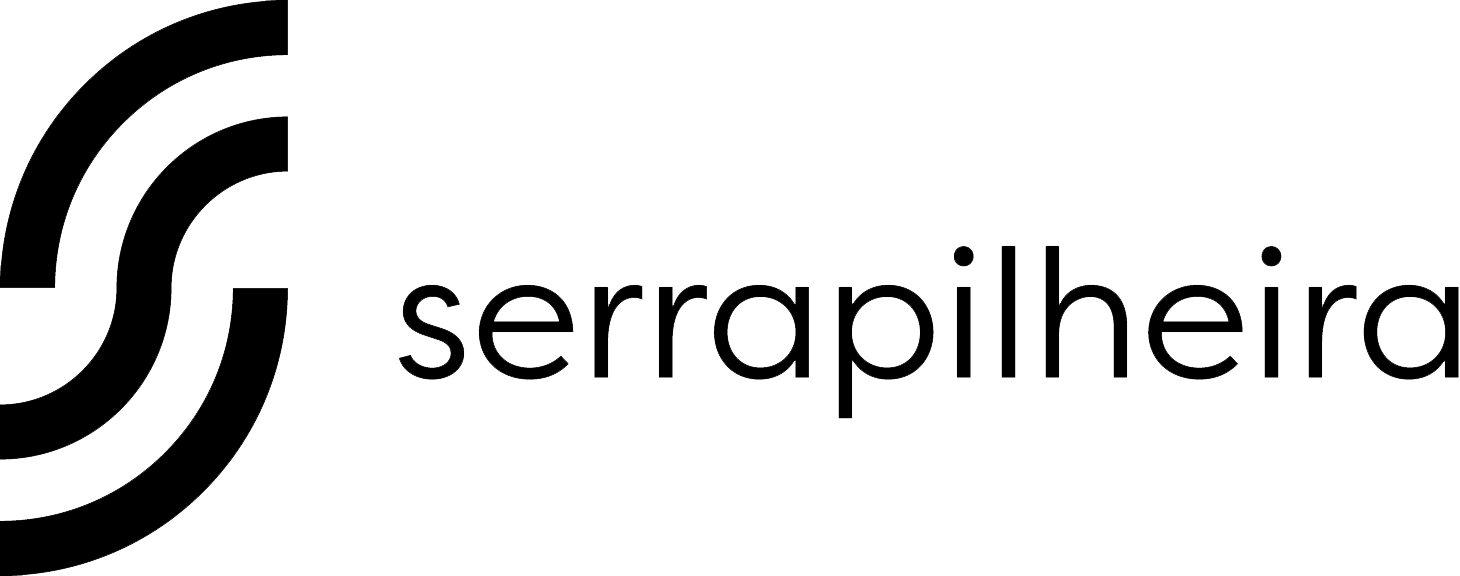
Home
We understand governance as management at the highest level of countries and the world. Governance implies decision-making in a context of high risk and high uncertainty where stakeholders have conflicting interests.
The context of governance challenges science. Mathematical modeling can be part of the solution, but it can be a part of the problem as well. The school aims to develop an awareness of the challenges involved and will provide “food for thought” to develop comprehension of what is involved, a consciousness of the capabilities, limitations of mathematical modeling in decision-making, and self-awareness.
We will address the question: Why and how science for governance is “science with consciousness” (also called complex thinking) and must be different from “everyday science” ( technically speaking: normal science).
The course will address how a complex systems approach modifies our mathematical modeling. We will critically examine stochastic models and their relations to deterministic ones emphasizing the trade-off between mathematical accessibility and truth value.
The second part of the course will address, in mathematical form, decision theory and its relation to game theory. We will discuss decision making under uncertainties, game equivalence, game strategies, evolutionary games and more.
The activity will consist of lectures, debate forums, and practices on specific problems. The lecture classes (L) will address the different topics in different forms: Matters of logic and epistemology will take the form of discussion and debate forums (D). Specific problems (P) will fill the proposed daily activities putting into practice the subjects already discussed. Active participation of students will be encouraged at all times.
There is no registration fee and limited funds are available for travel and local expenses.
Organizers:
- Hernan G. Solari (IFIBA-CONICET and FCEN-UBA, Argentina)
- Christian E. Schaerer (FP-UNA, Paraguay)
- Claudia Pio Ferreira (IBB – Unesp, Brazil)
- Marcelo Kuperman (CNEA-CONICET and Instituto Balseiro, Argentina)
List of participants: Updated on November 14, 2023.
Survey: Here
Lecturers and Speakers
Lectures
- Mathematical modeling in the context of governance by CF, MK, CS and HS
- Basic epistemology: Why and how Science for governance differs from normal (everyday) science by HS
- Stochastic processes: Introduction and the determinist limit by HS
- Introduction to Planning Decision Making by MK
- Decision Making and game theory by MK
Lecturers:
- CF: Claudia Pio Ferreira (IBB – Unesp, Brazil)
- MK: Marcelo Kuperman (CNEA-CONICET and Instituto Balseiro, Argentina)
- CS: Christian E. Schaerer (FP-UNA, Paraguay)
- HS: Hernan G Solari (FCEN-UBA & IFIBA-CONICET, Argentina)
Specific Problems:
- P1: Is the phenomenological moment part of science or not? (by HS)
- P3: Aedes aegypti populations. Fisheries. Check rules for correct modelling (by CF & HS)
- P4: Exploration and conservation of natural resources (by MK)
- P5: The rational use of resources to achieve sustainability (by CS)
Debate sessions:
- D1: Philosophy and politics of modeling.
Invited talks: Silvio Funtowicz (University of Bergen, Norway) and Andrea Saltelli (University of Bergen, Norway) [Philosophy]
- D2: Field interventions using genetically modified Aedes aegypti mosquitoes in Brazil.
Invited Talks: Luísa Reis-Castro (USC, USA) [Anthropology]
- D3: Controlling insects
Invited talk: Ary Hoffmann (U. Melbourne, Australia)[Ecology]
- D4: Management of complex ecosystems
Invited talk: Adrian Monjeau (U. Patagonia & F. Bariloche, Argentina) [Ecology] and Pedro Laterra (U. Buenos Aires, Argentina) [Biology]
- D5: The rational use of resources to achieve sustainability.
Invited talk: Antonieta Rojas de Arias (CEDIC, U. Asunción, Paraguay) [Biology]
Reading Materials: Here
Registration
Announcement:
Online application is closed
Program
Download de program: PDF
Basic epistemology: Truth, belief and doubt. Experience and cognition. The place of models and theories in science. Cognition: imagination or abstraction? Consequences for modeling. Scientific inference. Difference between observed and fact. Is epistemology partially determined by our goals? Abductive/retroductive, deductive and predictive moments in the construction of models. The constructive spiral. Interdependence of the constructive moments. The phenomenological links with the observable. Logical principles of modeling: reality, no arbitrariness, continuity of reason, cognitive surpass, mediation, the logical collapse of a theory (refutation), dialectical openings.
Stochastic process: Introduction: Populations and events. Evolution of populations through events. Intrinsic stochasticity. Distribution of times between events. Heavy-tailed distributions versus Exponential distribution. Individuals in stages or stages of the individual? A-priori or a-posteriori statistics? Models based on individuals, populations, and meta-populations. Deterministic limit Kurtz’ theorems. The deterministic limit as a large number and short time approximation. Stochastic fluctuations around the limit. Validity of the approximation.
Planning decision making: Basis concepts of decision theory: alternatives; constraints; objectives. Choices under certainty: preferences and utility; choice. Choices under ignorance: contingent results, maxmin, minmax and mixed rules. Choices under uncertainty. Von Neuman-Morgestern Expected utility. Basic concepts of non-cooperative game theoretic situations. Game representation: Normal form, extensive form and backward induction. Strategies: pure/mixed, dominant/dominated, conservative, best response, rationalizability. Nash equilibrium: unicity, multiplicity, absence of equilibria in pure strategies, efficiency. Repeating a game. Evolutionary game: Replicator dynamics, stability. Representation of cooperative games Imputations. Stable allocations: the “core” of a cooperative game. The “Shapley” value.
L are lectures, P are problem solving sessions and D for talks and discussion sessions.
Videos and Files
-
09:00 - Hernan G Solari (FCEN-UBA & IFIBA-CONICET, Argentina):
TBA - Class 1 of 4
-
11:00 - Hernan G Solari (FCEN-UBA & IFIBA-CONICET, Argentina):
TBA - Class 2 of 4
-
14:30 - Silvio Funtowicz and Andrea Saltelli (University of Bergen, Norway / University of Bergen, Norway)):
Philosophy and politics of modeling.
- 17:00 - Luísa Reis-Castro (USC, USA): Field interventions using genetically modified Aedes aegypti mosquitoes in Brazil.
-
09:00 - Hernan G Solari (FCEN-UBA & IFIBA-CONICET, Argentina):
TBA Class 3 0f 4
-
11:00 - Hernan G Solari (FCEN-UBA & IFIBA-CONICET, Argentina):
TBA - Class 4 of 4
- 14:00 - Claudia Pio Ferreira (IBB-Unesp): Challenges on using the wolbachia-infected mosquito to control dengue transmission
-
18:00 - Ary Hoffmann (U. Melbourne, Australia):
Controlling insects
-
09:00 - Marcelo Kuperman (CNEA-CONICET and Instituto Balseiro, Argentina):
Introduction to Planning Decision Making - Class 1
-
11:00 - Marcelo Kuperman (CNEA-CONICET and Instituto Balseiro, Argentina):
Introduction to Planning Decision Making - Class 2
-
14:00 - Adrian Monjeau and Pedro Laterra (U. Patagonia & F. Bariloche, Argentina / . Buenos Aires, Argentina):
Management of complex ecosystems
-
14:30 - Marcelo Kuperman (CNEA-CONICET and Instituto Balseiro, Argentina):
Introduction to Planning Decision Making - Class 3
-
09:00 - Antonieta Rojas de Arias (CEDIC, U. Asunción, Paraguay):
The rational use of resources to achieve sustainability.
-
10:30 - Marcelo Kuperman (CNEA-CONICET and Instituto Balseiro, Argentina):
Introduction to Planning Decision Making - Class 4
-
14:00 - Adrian Monjeau and Pedro Laterra (U. Patagonia & F. Bariloche, Argentina / . Buenos Aires, Argentina):
Management of complex ecosystems
asdasdasd
Photos
Additional Information
BOARDING PASS: All participants, whose travel has been provided or will be reimbursed by ICTP-SAIFR, should bring the boarding pass upon registration. The return boarding pass (PDF, if online check-in, scan or picture, if physical) should be sent to secretary@ictp-saifr.org by e-mail.
COVID-19: Brazilians and foreigners no longer have to present proof of vaccination before entering the country.
Visa information: Nationals from several countries in Latin America and Europe are exempt from tourist visa. Nationals from Australia, Canada and USA are exempt from tourist visa until January 10, 2024. Please check here which nationals need a tourist visa to enter Brazil.
Accommodation: Participants, whose accommodation will be provided by the institute, will stay at The Universe Flat. Hotel recommendations are available here.
How to reach the Institute: The school will be held at ICTP South American Institute, located at IFT-UNESP, which is across the street from a major bus and subway terminal (Terminal Barra Funda). The address which is closer to the entrance of the IFT-UNESP building is R. Jornalista Aloysio Biondi, 120 – Barra Funda, São Paulo. The easiest way to reach us is by subway or bus, please find instructions here.
Continue Reading |
Comments Off on
Proposals to Boost STEM Participation in Underrepresented Groups
São Paulo, Brazil
Home
Lecturers
Registration
Program
Poster presentation
Additional Information
Registration:
List of Participants:
BOARDING PASS: All participants, whose travel has been provided or will be reimbursed by ICTP-SAIFR, should bring the boarding pass upon registration. The return boarding pass (PDF, if online check-in, scan or picture, if physical) should be sent to secretary@ictp-saifr.org by e-mail.
COVID-19: Fully vaccinated Brazilians and foreigners are required to present proof of vaccination, printed or electronically before boarding an international flight. Not vaccinated and not fully vaccinated passengers have to present a medical certificate with a negative test result before entering the country. Tests should be taken up to 24 hours before boarding.
Visa information: Nationals from several countries in Latin America and Europe, Australia, Canada, Japan and USA are exempt from tourist visa. Please check here which nationals need a tourist visa to enter Brazil.
Accommodation: Participants, whose accommodation will be provided by the institute, will stay at The Universe Flat. Hotel recommendations are available here.
How to reach the Institute:
Continue Reading |
Comments Off on
Introductory Minicourse on AdS-CFT
May 29 – June 2, 2023
ICTP-SAIFR, São Paulo, Brazil
Home
In order to provide students with the necessary background to be able to benefit from the Holography@25 event, there will be a hybrid series of 10 lectures in the 5 days before the event (May 29th to June 2) by Horatiu Nastase on an Introduction to AdS/CFT. The target audience are Masters and PhD students who are not familiar with AdS/CFT.
The lectures will be held in-person in the IFT-UNESP auditorium. Online participants from the Holography@25 school will receive a zoom link by E-mail. The course will include quick reviews of relevant issues about supersymmetry and supergravity, string theory and conformal field theory, as well as daily problem-solving sessions and Q&A sessions.
The event will be followed by the Holography@25 event which will include a School (June 5-13, 2023) for graduate students and a Workshop (June 14-17, 2023) for researchers.
There is no registration fee or application form and interested graduate Physics students from greater Sao Paulo area are invited to participate in person.
Lecturer:
- Horatiu Nastase (IFT-UNESP, Brazil)
Program:
Times: 10.00-11.30 (first lecture) and 13.00-14.30 (second lecture). 15.00-16.30 Problems and Q&A.
List of Participants: Updated on May 24, 2023
POSTER:
Photos
Videos and Files
PDF for all classes – here
PDF for Exercises 1 – Exercises 2 – Exercises 3 – Exercises 4 – Exercises 5
2023-05-29-
10:00 - Horatiu Nastase (IFT-UNESP, Brazil):
Elements of general relativity and AdS space
-
13:00 - Horatiu Nastase (IFT-UNESP, Brazil):
Elements of string theory and D-branes
-
10:00 - Horatiu Nastase (IFT-UNESP, Brazil):
Black holes in supergravity vs. D-branes
-
13:00 - Horatiu Nastase (IFT-UNESP, Brazil):
AdS/CFT and gauge/gravity duality in Euclidean and Lorentzian signatures
-
10:00 - Horatiu Nastase (IFT-UNESP, Brazil):
Holographic renormalization and holographic RG flow
-
12:30 - Horatiu Nastase (IFT-UNESP, Brazil):
Finite temperature and N=4 SYM plasma
-
10:00 - Horatiu Nastase (IFT-UNESP, Brazi):
Solitons and probes in AdS/CFT
-
13:00 - Horatiu Nastase (IFT-UNESP, Brazil):
The pp wave correspondence and spin chains
-
10:00 - Horatiu Nastase (IFT-UNESP, Brazil):
Applications to condensed matter: AdS/CMT
-
13:00 - Horatiu Nastase (IFT-UNESP, Brazil):
Applications to QCD
asdasdasd
Additional Information
How to reach the Institute: The minicourse will be held at ICTP South American Institute, located at IFT-UNESP, which is across the street from a major bus and subway terminal (Terminal Barra Funda). The address which is closer to the entrance of the IFT-UNESP building is R. Jornalista Aloysio Biondi, 120 – Barra Funda, São Paulo. The easiest way to reach us is by subway or bus, please find instructions here.
Continue Reading |
Comments Off on
Coordenador/Organizador de Eventos do ICTP-SAIFR
O ICTP-SAIFR – International Centre for Theoretical Physics – South American Institute for Fundamental Research é um centro internacional de física que organiza escolas e workshops em inglês para alunos de pós-graduação e pesquisadores do Brasil e do exterior. O ICTP-SAIFR está localizado no Instituto de Física Teórica da UNESP (Universidade Estadual Paulista), ao lado do Terminal Barra Funda no centro da cidade de São Paulo.
O ICTP-SAIFR está procurando uma pessoa para a coordenação e organização de eventos científicos, em regime de 40 horas semanais, presencial.
A pessoa a ser contratada deve ter:
– Experiência com a coordenação e organização de eventos
– Inglês fluente para redação e conversação
– Experiência como usuário de informática incluindo domínio do pacote Office (Word, Excel e Power Point)
É importante que o candidato saiba trabalhar bem sob pressão, principalmente nos períodos de pico de trabalho, que são comuns na dinâmica de nossos eventos. Outra característica que será avaliada é a boa capacidade de relacionamento e de trabalho conjunto com os demais membros da equipe.
A Faixa salarial inicial é entre 5-10 mil reais mensais e o valor será definido de acordo com a experiência do candidato. Enviar currículo e referências o mais rápido possível para marrey@ictp-saifr.org
Continue Reading | Comments Off on Coordenador/Organizador de Eventos do ICTP-SAIFR
Arrival Instructions – Hotels and Principia Institute
Hotel The Universe (Rua Pamplona, 83 – Bela Vista)
Principia Institute (Rua Pamplona, 145 – Bela Vista)
Travel Inn Paulista Wall Street (Rua Itapeva, 636 – Bela Vista)
Hotel The Universe and Principia Institute and Travel Inn Paulista Wall Street are located in downtown Sao Paulo, ten minutes walk from the metro station Trianon/MASP. Hotel The Universe and Principia Institute are 50 meters from each other, and Travel Inn Paulista Wall Street is two blocks away.
From the International Guarulhos Airport:
Public transportation (60-90 minutes): There is an express train between the International Guarulhos Airport and the metro station Estação Luz which leaves on the hour from the airport and from Estação Luz. It takes 30 minutes and costs about one dollar (4.40 BRL). First you take a shuttle bus from your airport terminal to the train station (about 15 minutes). Then you purchase the ticket at the train station. The train leaves on the hour between 5 am until midnight (5 am, 6 am, etc).
From Estação Luz you take the Yellow metro line 4 (Linha Quatro Amarela) towards Vila Sonia and get off at the third station, which is Paulista Pernambucanas. From Paulista Pernambucanas, you walk through a tunnel to Consolação at the Green line 2 (Linha Dois Verde) and take a train towards Vila Prudente. You get off at the next station, which is Trianon/MASP. You exit the subway onto Avenida Paulista towards Rua Pamplona. For Hotel The Universe, you walk one block in the southeast direction and turn left onto Rua Pamplona. For Travel Inn Paulista Wall Street, you walk one block in the northwest direction and turn right onto Rua Itapeva.
There are also Taxi and Uber services at the airport (30-60 minutes).
Taxi: 120-150 BRL
Uber X: 80-120 BRL
From the Congonhas Airport
Public transportation (40-80 minutes): There is a bus between the International Congonhas Airport and the metro station São Judas, which is: 609J/10 Aeroporto de Congonhas – Metrô São Judas. The fare is 4,40 reais, which is about a dollar, and you have to pay in cash.
After entering the metro station and buying the ticket at the same price, you take a train towards Tucuruvi and get off at the fifth station, which is Ana Rosa. Move to Green line 2 (Linha Dois Verde), take a train towards Vila Madalena and get off at the third station, which is Trianon/MASP. You will exit the subway onto Avenida Paulista towards Rua Pamplona. For Hotel The Universe, you walk one block in the southeast direction and turn left onto Rua Pamplona. For Travel Inn Paulista Wall Street, you walk one block in the northwest direction and turn right onto Rua Itapeva.
There are also Taxi and Uber services at the airport (20-50 minutes).
Taxi: 100-130 BRL
Uber X: 60-100 BRL
From Terminal Rodoviário Tietê
Inside the Terminal Rodoviario-Tietê there is a metro station called Portuguesa-Tietê on the Blue metro line 1 (Linha Um Azul). The metro ticket costs 4,40 reais. Take a train towards Jabaquara and get off on Paraiso. Move to Green line 2 (Linha Dois Verde), take a train towards Vila Madalena and get off at the second station, which is Trianon/MASP. You will exit the subway onto Avenida Paulista towards Rua Pamplona. For Travel Inn Paulista Wall Street, you walk one block in the northwest direction and turn right onto Rua Itapeva.
From Hotel The Universe you go out onto Rua Pamplona, turn left and walk about 50 m to Principia Institute.
Continue Reading |
Comments Off on
APS/ICTP-SAIFR Satellite April Meeting
April 26, 2023
ICTP-SAIFR, São Paulo, Brazil
Auditorium of IFT-UNESP
Youtube live streaming: https://youtube.com/live/lKOQzqoVTX0?feature=share
Home
To extend the reach and diversity of its annual meetings, the American Physical Society has developed a pilot program of APS Satellite Meetings. In 2022, these satellite meetings were held in Africa and Asia, and in 2023, the satellite meetings will also include Latin America through the ICTP South American Institute for Fundamental Research (ICTP-SAIFR). As part of its virtual April Meeting, ICTP-SAIFR will be organizing on April 26 two sessions on Cosmology and Astrophysics/Neutrino Experiments which will be broadcast live to all participants of the APS Virtual April Meeting, as well as two sessions for student/postdoc presentations on cosmology/astrophysics/particle physics.
Graduate students and postdocs can apply until April 19 to give oral presentations or posters at the student-postdoc sessions using the registration form on this webpage, and ground transportation will be reimbursed for those who give oral or poster presentations.
The sessions on April 26 will be held in-person in the IFT-UNESP auditorium from 13:30 – 19:00 and will also be broadcast online. The complete schedule of sessions of the APS Virtual April Meeting can be found on the APS April Meeting webpage
Registered participants can either attend sessions in the IFT-UNESP auditorium or online. To help accomplish the goal of extending the reach and diversity of the April Meeting, there is no registration fee for in-person or online participation in the APS/ICTP-SAIFR Satellite Meeting.
Schedule and Speakers
Student/Postdoc session on cosmology
14:30-15:00 Coffee break
APS Satellite session on Latin-American participation in Cosmology experiments: 15:00 – 16:00 (Brazil time)
Chair: Rogerio Rosenfeld (ICTP-SAIFR/IFT-UNESP)
15:00-15:15 Riccardo Sturani (ICTP-SAIFR/IFT-UNESP) Gravitational Wave Astronomy and Fundamental Physics
15:15-15:30 Raul Abramo (IFUSP) Javalambre Physics of the Accelerating Universe Astrophysical Survey
15:30-15:45 Marcos Lima (IFUSP) Dark Energy Survey
15:45-16:00 Mariana Penna-Lima (UnB) Rubin Telescope’s Legacy Survey of Space and Time (LSST)
Student/Postdoc session on particle physics and astrophysics
16:00-16:12 Barbara Sales Costa (USP) – Recoil Directionality experiment (ReD)
16:12-16:24 Pedro Zilves Ventura (UFRJ) – Low-Energy Background Spectrum with Skipper-CCDs at CONNIE
16:24-16:36 Renan de Aguiar (Unicamp) – X-ARAPUCAs for DUNE and protoDUNE
16:36-16:48 Luis Gustavo Paixão (Unicamp) – Long baseline neutrinos in DUNE with X-ARAPUCA
16:48-17:30 Coffee break
APS Satellite session on Latin-American participation in Astrophysics/Neutrino experiments: 17:30 – 19:00 (Brazil time)
Chair: Ettore Segreto (UNICAMP)
17:48 – 18:06 Edivaldo Moura Santos (USP) CTA experiment
18:06 – 18:24 Gustavo Valdiviesso (UNIFAL) DUNE experiment
18:24 – 18:42 Rogerio Menezes de Almeida (Univ. Fed. Fluminense) Auger experiment
18:42 – 19:00 Irina Nasteva (UFRJ) CONNIE experiment
Registration
Videos and Files
Photos
Additional Information
Poster presentation: Participants who are presenting a poster MUST BRING A BANNER PRINTED. The banner size should be at most 1 m (width) x 1,5 m (length). We do not accept A4 or A3 paper. Click here to see what a banner looks like: http://designplast.ind.br/produtos/detalhe/impressao-digital/banner/119/9
How to reach the Institute: The program will be held at ICTP South American Institute, located at IFT-UNESP, which is across the street from a major bus and subway terminal (Terminal Barra Funda). The address which is closer to the entrance of the IFT-UNESP building is R. Jornalista Aloysio Biondi, 120 – Barra Funda, São Paulo. The easiest way to reach us is by subway or bus, please find instructions here.
Continue Reading |
Comments Off on
SAIFR/SIRIUS Brazilian Workshop on Soft Matter
October 4-6, 2023
São Paulo, Brazil
ICTP-SAIFR/IFT-UNESP & SIRIUS/CNPEM
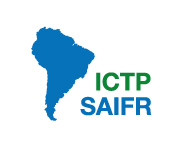

![]()
Home
Soft matter encompasses a wide variety of disparate systems, ranging from polymers and colloids to surfactants, liquid crystals and active biological matter (e.g. bacteria and flocks of birds). The Brazilian Workshop on Soft Matter will bring together experienced students and researchers, and provide a platform for fostering collaboration among members of the soft matter community in Brazil, as well as a forum for discussion of key recent developments in the field. In addition to several research seminars that will be given by outstanding invited speakers, selected participants will have the opportunity to present short talks, and take part in a series of activities at the new Brazilian synchrotron light source (Sirius).
The first two days of the workshop will take place at IFT-UNESP in the city of São Paulo and the third day at Sirius in the nearby city of Campinas. At Sirius, the activities will consist of a series of presentations, which will be followed by an extensive visit to the experimental stations, also known as beamlines. This experience will allow the students to observe and interact with state-of-the-art scientific equipment at Sirius.
There is no registration fee and limited funds for local expenses will be available for graduate students and researchers who have their abstracts approved for a short talk. Transportation between São Paulo and Campinas will be provided.
Organizers:
- Mateus B. Cardoso (Sirius-CNPEM)
- Pablo de Castro (ICTP-SAIFR and IFT-UNESP)
- Antonio M. Figueiredo Neto (IF-USP)
- Danilo B. Liarte (ICTP-SAIFR and IFT-UNESP)
- Cristiano L. P. de Oliveira (IF-USP)
List of participants: Updated on October 09, 2023
Satisfaction Survey: HERE
Speakers
- Carolina Brito (UFRGS, Brazil)
- Emanuela del Gado (Georgetown University, USA)
- Francisca Guzmán-Lastra (Universidad de Chile)
- Hartmut Löwen (University of Düsseldorf, Germany)
- Jennifer Schwarz (Syracuse University, USA)
- Julien Chopin (UFBA, Brazil)
- Luiz Roberto Evangelista (UEM, Brazil)
- Mathilde Champeau (UFABC, Brazil)
- M. Lisa Manning (Syracuse University, USA)
- Ronald Dickman (UFMG, Brazil)
- Tomás Grigera (Universidad de La Plata, Argentina)
- Watson Loh (UNICAMP, Brazil)
Format: 25 min talk + 5 minutes Questions
Registration
Program
Contributed Talks
Contributed I
1. Francisco Rocha (Aix-Marseille University, France): Rheology of cohesion-controlled granular materials
2. Leandro Rizzi (Universidade Federal de Viçosa (UFV), Brazil): On the origin of the negative energy-related contribution to the elastic modulus of rubber-like gels
3. William de Castilho (USP, Brazil): A renormalization group study of a simple cholesteric model
4. Renan Augusto Lisboa Almeida (IF-UFRGS, Brazil): Percolation in the ordering kinetics of twisted nematic phases
5. Dora Izzo (Instituto de Física – Universidade Federal do Rio de Janeiro, Brazil): Solutions of rods and spheres: predictions for the diffusion coefficient
Contributed II
1. Gustavo During (Pontificia Universidad Católica de Chile, Chile): Collective motion in active solids
2. Felipe Barros (University of Concepción, Chile): Bacterial cargo in a drop: Hollow Micro-Shells
3. Saulo Diles (Faculdade de Física, Campus Salinópolis da Universidade Federal do Pará, Brazil): Spontaneous clustering of persistent self-propelled particles in narrow channels: Motility diversity effects
4. Pablo Muñoz (Universidad Técnica Federico Santa María, Brazil): Macroscale modeling of diel vertical migration in the presence of light gradients using SPDEs
Contributed III
1. Thais Enoki (Institute of Physics – University of Sao Paulo, Brazil): Investigating inter-leaflet coupling of asymmetric lipid bilayers
2. MARCIO SAMPAIO GOMES FILHO (ICTP-SAIFR / IFT-UNESP, Brazil): Modeling the diffusion-erosion crossover dynamics in drug release
3. Leila Separdar (UFSCAR, Brazil): Diffusion-controlled crystal growth kinetics in undercooled BaS semiconductor
4. Ana Novaes Dias (UFMG, Brazil): Mean Field Theory for a Vicsek-like Model on a Lattice
5. Igor Morais Telles (Universidade Federal do Rio Grande do Sul, Brazil): Effects of electrostatic coupling and surface polarization on polyelectrolyte brush structure
6. Vera B. Henriques (IFUSP, Brazil): Lattice Boltzmann calculations for fluid flow through porous or charged spheres and shells
Contributed IV
1. CARLOS EDUARDO FIORE DOS SANTOS (USP, Brazil): Powerful ordered collective engines
2. Matheus Valença Correia (Universidade Federal de Pernambuco (UFPE), Brazil): Structural phases of classical 2D clusters with competing two-body and three-body interactions
3. Lucas Nicolao (Departamento de Física, Universidade Federal de Santa Catarina, Brazil): Melting of the 2D solid phase of the Gaussian-core model explained
4. Adolfo Javier Banchio (Universidad Nacional de Córdoba and CONICET, Argentina): Structure and isomorphism in dipolar density interacting disks: simulations and integral-equation theories
5. Daniel Acuña (Departamento de Física, Facultad de Ciencias Físicas y Matemáticas, Universidad de Chile, Chile): Auxetic Granular Metamaterials
Format: 10 min talk + 5 minutes Questions
Updated: October 4, 2023
Sponsors' presentations
Poster Presentations
- Leonardo Santos Lopes (Universidade Federal de Minas Gerais, Brazil): Vicsek model with Malthusian Dynamics
- Italo Salas (Universidad de Chile, Chile): Understanding motility induced phase separation and Contagion Dynamics of active brownian particles using complex networks
- CRISTIAN ANDRÉS VILLALOBOS (Universidad de Chile, Chile): Flow fluctuation in confined bacterial suspensions
- Emanuel Fortes Teixeira (Instituto de Física da Universidade Federal do Rio Grande do Sul (UFRGS), Brazil): Investigating the Hypothesis of Differential Surface Contraction through Active Rings for Cellular Tissue Segregation
- Edmundo Ignacio Vazquez Aguilar (Instituto de Física, Universidad Nacional Autónoma de México, México): Intermediate scattering function of Active Particles in Viscoelastic Fluids using Differential Dynamic Microscopy
- LUCAS GABRIEL BEZERRA DE SOUZA (Federal University of Rio Grande do Norte, Brazil): Two-Stage Pattern Formation in Dense Active Mixtures
- Bernardo Boatini (Instituto de Física da UFRGS, Brazil): Sorting for active particles with velocity self-alignment
- Constanza Rivas (Universidad de Concepción, Chile): Modeling active wetting with a particle bath
- Paulo Casagrande Godolphim (Departamento de Física – Universidad de Chile, Brazil): Micromechanics: quantitative modeling in fish embryo morphogenesis
- Pablo Pérez (Universidad de Chile, Chile): Non-equilibrium thermodynamic description of active wetting
- Joaquín Morales (Universidad de Chile, Chile): Synchronized motion under light gradients
- Oscar Sebastián Garrido (Universidad de Chile, Chile): Magnetic Hexbugs confined to a parabolic surface
- Pamela Muñoz Obreque (Universidad de Chile, Chile): Magnetic robots in confined environments
- Felipe Hawthorne Gomes da Costa (Universidade de São Paulo, Brazil): The effect of translational noise in Motility Induced Phase Separation
- Andre Timpanaro (CMCC – UFABC, Brazil): Adaptive networks for agent interactions in the voter model
- Arthur Prado Camargo (IFUSP, Brazil) Molecular Dynamics Simulations of Water and Ions Capillary Bridges in Nanoscale Slit Pores
- Ethe de Araujo Portilho (Universidade Federal do Maranhão, Brazil): Study of the mechanism of action of the drug chloroquine at the molecular and cellular level
- Lucas Raimundo Rodrigues (Universidade Federal Fluminense, Brazil): Entropy of Rigid k-mers on a Square Lattice
- Dante Arroyo Anhesini (Universidade Estadual Paulista “Júlio de Mesquita Filho”, Brazil): Critical Adsorption of Polyelectrolytes Onto Heterogeneously Charged Surfaces
- Rodrigo Fernandes (IF-USP, Brazil): SELF-ASSEMBLE GUANOSINE DERIVATIVE HYDROGELS: NEW FORMULATIONS AND DRUG DELIVERY
- Gabriel Braga Marques Teobaldo (Physics Institute of the University of Sao Paulo, Brazil): Hydration Kinetics of Thermoactivated Recycled Cement Pastes Investigated by X-ray Scattering
- Thales Souza Freire (Universidade São Paulo, Brazil): Free energy topology calculations applied to transport proteins
- Gustavo Antonio Leme Forão (Universidade de São Paulo, Brazil): General Features of Collective Engines
- AUGUSTO CESAR DE CAMARGO BANDEIRA (IF-USP, Brazil): Investigation of structural changes on human hair induced by thermal and cosmetic treatments
- Erick Henrique Agnolin (IFSC-USP, Brazil): Characterization of the Semicrystalline Phase in Polyfluorene-Based Conductive Copolymers Using Powder X-Ray Diffraction and Thermal Analysis
- Amin Bakhshandeh (UFRGS, Brazil): Theory of Charge Regulation of Colloidal Particles
- Patrick S Simonario (Universidade Estadual de Maringá, Brazil): Electric field perturbation in a twist-bend nematic cell: a non-linear solution
- Diego Romero (Universidad de Chile, Chile): Magnetic robots in confined environments
- Lara Guzman (Universidad Nacional de Córdoba, Argentina): Nurture microfluidic selection of the closest animal cell relatives: models and experiments
- Marina Palacio (Universidad Nacional de Córdoba, Argentina): Modeling sperm cells under ultraconfinement to innovate in clinical applications
Participants MUST BRING THE BANNER PRINTED.
For details about the poster presentation please look at the correspondent Additional Information topic.
Updated: September 26, 2023
Videos and Files
-
09:00 - Jennifer Schwarz (Syracuse University, USA):
Using model active tissues containing active chromatin to test multi-scale hypotheses in organoids
- 09:30 - Luiz Roberto Evangelista (UEM, Brazil): Fractional Calculus as a Tool for Applications in Soft Matter: Electrical Impedance Response of Liquid Crystals
- 10:00 - André Polloni (Anton Paar): Exploring SAXS and USAXS to measure several properties of soft matter using small amounts of sample
-
11:00 - Brazilian Workshop on Soft Matter (Brazilian Workshop on Soft Matter):
Contributed 1
- 14:00 - Hartmut Löwen (Heinrich Heine University Düsseldorf): Self-propelled particles
-
15:30 - Ronald Dickman (UFMG, Brazil):
Phase Transitions in Active Matter
- 16:00 - Tomás Grigera (Universidad de La Plata, Argentina): Critical dynamics of natural swarms
-
16:30 - Francisca Guzmán-Lastra (Universidad de Chile):
Controlling vertical transport driven by active carpets at viscosity interfaces
-
17:00 - Brazilian Workshop on Soft Matter (Brazilian Workshop on Soft Matter):
Contributed 2
-
09:00 - Mathilde Champeau (UFABC, Brazil):
4D printing of hydrogels
-
09:30 - Watson Loh (UNICAMP, Brazil):
Soft core-shell nanoparticles with controlled architectures
-
10:00 - Kriss Leftwich (Xenocs):
Xeuss 3.0 Platform from Xenocs
-
11:00 - Brazilian Workshop on Soft Matter (Brazilian Workshop on Soft Matter):
Contributed 3
-
14:00 - M. Lisa Manning (Syracuse University, USA):
Origin of rigidity in biological tissues
-
15:00 - Carolina Brito (UFRGS, Brazil):
Metastability in wetting phenomena
-
16:00 - Emanuela del Gado (Georgetown University, USA):
The hidden hierarchical nature of soft particulate gels
-
16:30 - Julien Chopin (UFBA, Brazil):
Tensional twist-folding and scrolling of sheets
-
17:00 - Brazilian Workshop on Soft Matter (Brazilian Workshop on Soft Matter):
Contributed 4
asdasdasd
Photos
Additional Information
COVID-19: Brazilians and foreigners no longer have to present proof of vaccination before entering the country.
Visa information: Nationals from several countries in Latin America and Europe are exempt from tourist visa. Nationals from Australia, Canada and USA are exempt from tourist visa until January 10, 2024. Please check here which nationals need a tourist visa to enter Brazil.
Accommodation: Participants, whose accommodation will be provided by the institute, will stay at The Universe Flat. Hotel recommendations are available here
How to reach the Institute: The school will be held at ICTP South American Institute, located at IFT-UNESP, which is across the street from a major bus and subway terminal (Terminal Barra Funda). The address which is closer to the entrance of the IFT-UNESP building is R. Jornalista Aloysio Biondi, 120 – Barra Funda, São Paulo. The easiest way to reach us is by subway or bus, please find instructions here.
Poster presentation: Participants who are presenting a poster MUST BRING A BANNER PRINTED. The banner size should be at most 1 m (width) x 1,5 m (length). We do not accept A4 or A3 paper. Click here to see what a banner looks like: http://designplast.ind.br/produtos/detalhe/impressao-digital/banner/119/9
Continue Reading |
Comments Off on
Brazilian Meeting of Science Communicators
September 8-10, 2023
São Paulo, Brazil
Principia Institute

In the second edition, the theme is “Science, communication and politics: drivers of change in society”. We will discuss how science communicators can influence the implementation of a variety of public policies in topics such as: Health, environment, misinformation, gender prejudice and others.
The meeting will take place from September 8-10 at Instituto Principia in São Paulo (Rua Pamplona, 145 – near the Trianon-MASP subway station) and is organized by ICTP-SAIFR together with Blogs de Ciência da Unicamp, a science outreach project from University of Campinas (Unicamp), Instituto Principia, an institution that promotes several science popularization activities, and external collaborators.
The entire event will be held in Portuguese. Please check the website (https://www.blogs.unicamp.br/ebdc/) for more information.
Online registration: Click HERE
Continue Reading |
Comments Off on
